It’s a Wonderful Life quietly debuted in 1946 and went on to become one of the most beloved Christmas classics of all time. Sixty years later, Click showed up as yet another example of Adam Sandler’s slowly declining career after the apex of The Wedding Singer.
One tells a charming tale of a man learning that his life means more than he ever thought possible to many people while the other tells the story of a man learning that everyone in his life would be better off without him. But oddly enough, they’re both telling the same story. It’s a Wonderful Life simply succeeds while Click utterly fails.
With Christmas right around the corner, let’s compare these two films and find out why one is a delight to watch again and again while the other is painful to sit through even once.
Ambitious Yet Flawed Main Character
The main character in both films is a flawed man who is guilty of not appreciating what he has because of his insatiable ambition. In It’s a Wonderful Life, George Bailey is an overworked, underappreciated man who yearns to escape his small town of Bedford Falls in favor of something grander. What he really wants is to become a famous architect. Every time it seems like he’s about to break free from his mundane life, something happens to keep him tethered tighter than ever.
In Click, Michael Newman is a workaholic who takes his wife and kids for granted and treats everyone rudely. He is an up-and-coming architect who dreams of one day becoming a partner in his firm. But his family responsibilities keep getting in the way of his goals.
George is a likable everyman while Michael is a typical Adam Sandler character with major anger issues. George rarely loses his temper unless he witnesses too much injustice being done against himself or those he loves. But even the smallest annoyance is enough to make Michael fly off the handle and hurt people. I’ll get into more detail about how these characters diverge over the course of their respective films, but suffice it to say that George Bailey comes across as the kind of man who stands up to bullies while Michael Newman is just a bully.
Skipping Over Long Periods of Time
The two films skip around in the characters’ lives. It’s a Wonderful Life is told from the perspective of angels in heaven who are looking down on the life of George Bailey. They see him grow up and go from one pivotal event to the next, showing how George saved people’s lives and saved his town from financial ruin over the years.
Click is told from Michael Newman’s perspective. The magic controller he receives lets him skip over long periods of time and also pause and rewind to witness moments from his childhood and formative years. The problem is that Michael starts skipping over important moments in his life. He isn’t there to witness his father’s death or the events leading up to his divorce, or his children growing up and moving out, or pretty much anything else, except his superficial job promotions. I know, the point is that he’s self-centered and his work is more important to him than his family, but that still doesn’t make it particularly entertaining to watch him skip over anything that might emotionally resonate with the audience.
It’s a Wonderful Life works because every scene is meaningful. Each one offers a fresh insight into George’s character, and all of it comes into play when he loses everything and has to see what the world would be like without him. Click is such an unfocused mess that Michael actually has to double back in order to witness important moments that explain why he ended up where he is. Nothing seems terribly meaningful and instead is just played for laughs, like when he discovers he’s ballooned into a fat slob. We don’t see him grow as a person, we just see him go from one blunder to the next.
One Last Chat with Dad
George’s last interaction with his father is wonderful. His father asks George to come work at the family bank, but George explains his frustrations and desire to finally leave Bedford Falls and make something of his life. His father understands and doesn’t take offense. He tells his son to go and be happy. The whole scene feels cathartic, not mean-spirited. The father and son are being brutally honest with each other, but in the end they come to an understanding, and they express their love for each other.
Compare that to Michael’s last interaction with his father. He has to go back in time to experience the event as an outside observer because he was on autopilot when his dad tried to speak to him. And what he sees is horrific. His father is trying to spend time with him, but Michael keeps shooting him down. Eventually, he commits an unpardonable sin by telling his father he doesn’t care about his silly magic trick, which he’s been hyping up since Michael was a child. This break’s the father’s heart, and he quickly expresses his love for Michael before beating a hasty retreat.
In both cases the characters are brutally honest with each other and there’s an expression of love at the end, but It’s a Wonderful Life leaves you with a warm feeling, especially because you only realize in retrospect that this is the last conversation George would ever have with his father in this life. In Click, we already know Michael’s father is dead, and we’re just forced to witness the horror of Michael tearing his loving father down and making him die of a broken heart.
Love Story
The love story in It’s a Wonderful Life is touching and perfectly handled. A sweet girl named Mary loves George almost from the moment she meets him as a child. She grows up and her love for him only deepens as he remains aloof. He doesn’t even realize how much he loves her until he loses the dreams he thought were the most important to him and realizes that she is the one thing in life he needs the most. They stay happily married for many years after that.
In Click, the first time we see Michael he’s already married to a woman named Donna. (Note: Could that be a reference to actress Donna Reed who played Mary in It’s a Wonderful Life? Maybe it’s just an interesting coincidence) We get to go back and see their first kiss in a bar (how romantic). He realizes that she’s totally out his league, but for some reason she falls in love with him and stays in love no matter how much sorrow he puts her through over the ensuing years.
In the alternate reality that George experiences, Mary never marries and lives a sad, solitary life because George was the only man she could find true happiness with. In Michael’s alternate reality, Donna finds quite a bit of happiness with one of Michael’s rivals. In fact, she seems to be better off the farther she gets from Michael. But we’re supposed to want them to stay together “forever and ever.” No, George and Mary earn the right to be together while it’s never explained why Michael and Donna should be right for each other.
Seeing a World Without Himself
After growing up and starting a family, George comes to a moment of crisis when he believes the world would be better off without him. And much to his surprise, he is shown exactly that. He gets to interact with familiar faces, but it begins to dawn on him that everyone and everything in his hometown is worse off without him. Beloved family members are dead, loving friends have become heartless, and the town is utterly rotten to the core. He regains his will to live because he finally understands all the good he has done.
Michael, on the other hand, doesn’t get to see a world without himself, but one where he is constantly on “autopilot.” His mind is disengaged from people and situations, and he just kind of exists. In a way, it’s more horrifying than imagining what things would be like if he had never been born because he continues to affect people’s lives, but always negatively. Michael hurts and neglects every member of his family, yet despite that they all still love him.
All that Michael’s experience in the film teaches him is that he is a complete jerk and he’s not worthy of everything he’s been given. That’s the complete opposite of George Bailey’s experience. He learns his true worth and he learns to appreciate not only everything he’s been given but everything he’s given others.
Angels of Life and Death
Clarence is the angel sent in answer to many people’s prayers to save George from committing suicide. He does so by letting George see what the world would be like without him. If he can succeed in his mission, he’ll be promoted and earn his wings, so he has a real incentive to do his best. He does help George regain his will to live, and he leaves behind a special book with a message written inside reminding George of all that the experience has taught him about himself.
Morty is the angel of death who gives Michael the remote that controls his life. Unlike Clarence, Morty doesn’t come in answer to any prayers; he just shows up out of the blue. Plus, there’s no personal incentive for him to complete his mission. In the end, he helps Michael reprioritize his life and he leaves behind one more remote with a note attached. It just says he knows Michael will do the right thing with it. Michael reads the note and then promptly throws the remote in the trash.
There’s a lot to compare between these two characters, but I’d like to focus on their parting gifts. Clarence leaves George with his cherished copy of The Adventures of Tom Sawyer and a note for George to turn to if he ever needs to look back and remember what occurred that magical Christmas. Morty, however, gives Michael a gift he obviously expects him to instantly throw away. There’s nothing really significant about it. Michael has clearly learned that the remote actually controls him, not the other way around, so of course he doesn’t want to keep it. He doesn’t get a meaningful souvenir to remind him of the harrowing experience and lessons learned like George does.
It’s All a Dream?
When George discovers he’s not dead, he runs through Bedford Falls, shouting “Merry Christmas” to everyone. He doesn’t care what happens to him because he’s just so happy to be alive. He wants to be with everyone he loves, no matter the consequences.
Michael experiences similar jubilation after he wakes up and realizes he’s just been dreaming. He runs to his parents’ home to wish them well and then hurries to his own home to show his family that he’s a changed man.
The problem with Click is that it doesn’t show how Michael plans to resolve his work-family conflict. He’s going to take a camping trip with them. Fine. But what about his demanding boss and career aspirations? How is he planning to balance everything in his life? It’s never explained. It’s a Wonderful Life explains it all beautifully. Everyone George has helped through the course of the film returns the favor many times over by coming to his aid in his most desperate hour. He has become a beacon, letting everyone in his town shine. It’s a Wonderful Life is about much more than one man learning his lesson. It’s about an entire town coming together and showing their true colors by helping the one man who believed in them.
Why It’s a Wonderful Film
It’s a Wonderful Life is a pleasure to watch. Its story unfolds in the most natural way possible, inviting us to fall in love with a town full of memorable characters. Click is difficult to sit through. Its story spills all over the screen in a disorganized manner as it tells us to like a self-destructive jerk. One film knows exactly what to focus on to engross us in its world while the other just wants to get to the next mean-spirited joke.
That’s why It’s a Wonderful Life will live forever as a timeless classic while Click’s fame will grow more remote every year.
This is the Deja Reviewer wishing you a Merry Christmas and a Happy New Year!
All images are the copyright of their respective owners.
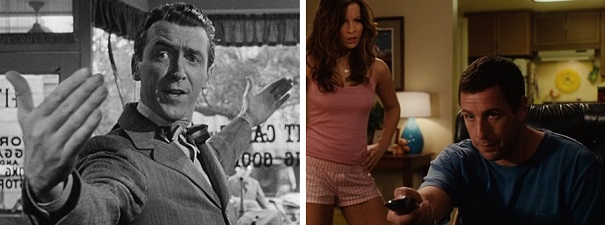
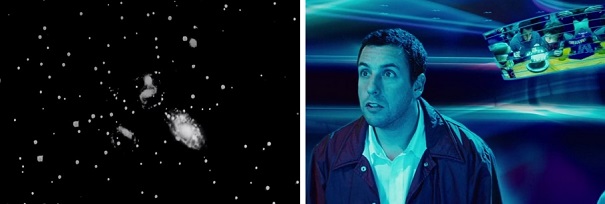
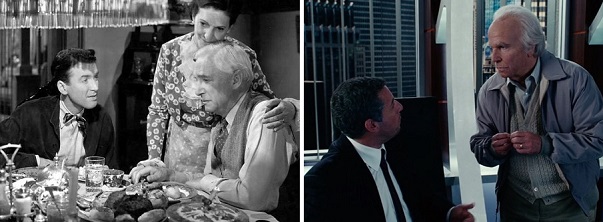

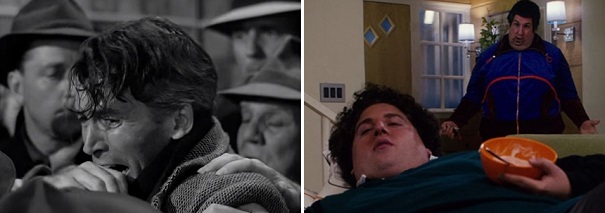
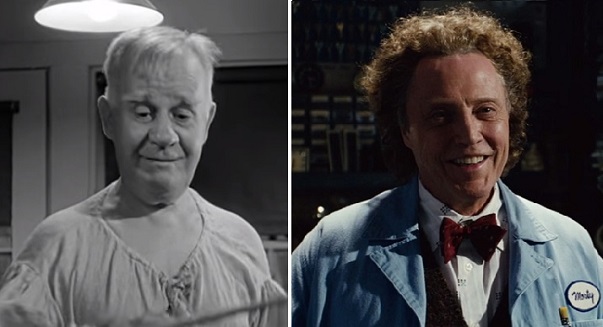
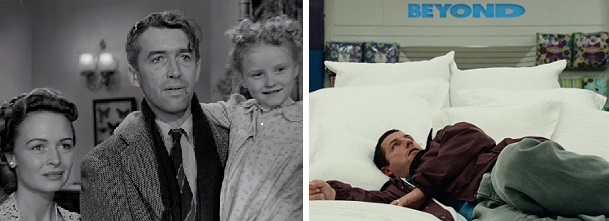

I think it’s hard to truly compare these 2 movies. First off, It’s a Wonderful Life is a classic, which is hard to compare any movie too, and Adam Sandler movies are well what they are. And besides I think the only person now-a-days who could live up to the feel good awesomeness of James Stewart is Tom Hanks, who did a great job in You’ve Got Mail, the remake of The Shop Around the Corner. But that’s the thing, Click wasn’t really a remake, it might’ve been based on the idea, but a lot of movies in a way rip off ideas. It’s like all the Romeo and Juliet stories out there, or Cinderella stories. You don’t necessarily call them remakes.
Cause the thing is It’s a Wonderful Life showed him what the world would’ve been like without him. It showed him the impact he’d made, and why he was so important. The goal was to make him appreciate what he had, and to not resent the obstacles that may have been thrown in his way. Which is very different than the point of Click.
Click never showed him what would’ve happened if he hadn’t been born. It showed him mainly the future, and what his life would turn into if he doesn’t change. Which is why the scene with his father is so terrible, it’s supposed to be. To make him realize that he’s only going to end up hurting everyone around him. That he is in fact hurting those around him in the present, and if he doesn’t change then they really would be better off without him. Which is why at the end it’s so great when he asks his dad about that magic trick, and makes his dad so happy because he wants to know. The point of the movie isn’t to show him how important he is or how great he’s been doing. It’s to show him how skewed he is, and that while he may accomplish his goals of getting promoted, he’ll ultimately lose everything that should’ve been important in his life.
Which really makes the goals of the movies rather different. Don’t get me wrong, I’m not saying Click is some great movie, but I think it’s an unfair comparison in too many ways.
LikeLike
I’m not saying Click is a remake of It’s a Wonderful Life. I’m saying that it follows the same pattern: an overworked guy gets visited by an angel who shows him a vision of what life would be like without him. He then learns a lesson and returns to his life with a change of heart.
Click is trying to tug at the audience’s heartstrings, but the story goes through so much lame comedy and annoying character moments along the way that it doesn’t earn its happy ending.
LikeLiked by 1 person
I’m just saying it’s like comparing an apple to an apple shaped diamond. And the while it is about a man being visited by an angel to change his life, that’s where the similarities end, and that doesn’t give enough to make it a viable comparison. I mean heck, do you know how many movies have done this sort of thing? I mean have you ever seen the Santa Clause 3? that would’ve been a better comparison, cause while he didn’t see what it would’ve been life if he never existed, he got to see what it would’ve been like if he never became Santa Clause. But that’s not the point, just saying, several movies have done the premise, and Click is the least close to it.
LikeLike
Maybe it is a bit unfair to expect an Adam Sandler comedy to be as good as a Frank Capra film. My point in writing this article was to show what It’s a Wonderful Life could have been in the hands of a less capable filmmaker. The makers of Click tried to make a good film, but its problems are even more glaring when compared to a film that perfectly did everything Click was trying to do.
LikeLiked by 1 person
What an intriguing comparison! Your tribute to Frank Capra by showing what he did right compared to a director who fell short-of-the-mark is an interesting approach.
LikeLiked by 1 person
Pingback: Why It’s a Wonderful Life Succeeds and Click Fails at Telling the Same Story | Retrospective Discussions
I have always loved ‘It’s A Wonderful Life’, and this was a great article to read.
I honestly tried to watch click…. I just couldn’t sit through it. It’s obvious where they got the formula for their scripts, but it just can’t compare to a classic!
Thanks so much for that article -I loved it! 🙂
LikeLiked by 1 person
You’re very welcome. Your comment really made my day. And thanks for the link, as well. 🙂
LikeLiked by 1 person
You’re very welcome :-)!
LikeLike
It’s a valuable exercise to see why one movie works beautifully and the other is just horrible. And am reminded once again what a brilliant movie “It’s A Wonderful Life” is.
LikeLiked by 1 person
I think a lot of the assessments here about the comparisons are correct but there are some key points that contrast with parts of this review.
Firstly, not everyone will relate to Click. It’s not a “classic”. It’s still just an Adam Sandler movie so it’s really not fair to compare the 2.
Second, it’s obvious enough that they’re basically the same story. George sees the world without him…Michael sees him without the world. Slightly different view but same song and dance.
Because Michael is a “horrible person” doesn’t mean that Click is terrible. That assessment just means you don’t like movies with assholes in them. Or maybe that you’ve never experienced someone like Michael in your life.
What Michael was tasked with realizing was how he was acting. Not how the world would be without him. There’s no shame in realizing that you’ve been acting differently than you realized and deciding to change your ways. Scrooge did it, right?
Anyway, in summation it’s a lot of pressure to compare Click to a Christmas classic and Click does a fine job of making the point it’s making. It’s not “It’s a wonderful life” and it doesn’t have to be. I don’t think anyone involved in the film thought it would rise to that level.
LikeLike
Fair point. Click is just a miserable experience to sit through, and I wanted to show that it’s a story that can be done well. A lazy Adam Sandler vehicle is not an ideal way to frame the story, though.
LikeLike